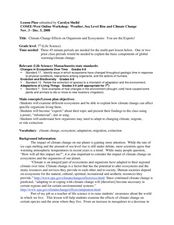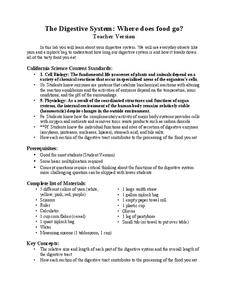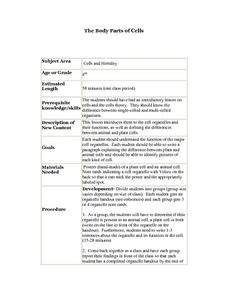Curated OER
Climate Change Effects on Organisms and Ecosystems: You are the Experts!
Seventh graders research about the effect of climate on different ecosystems. In this life science lesson plan, 7th graders present their research by creating a poster, infomercial, skit or song. They discuss how organisms adapt to...
Curated OER
Planting Parts
Each student plants two lima beans in a plastic cup with a paper towel so they can be observed growing. The beans are misted with a spray bottle, and placed in a warm sunny area. Students view the beans each day for the next two weeks,...
Curated OER
Plants
First graders learn the basic needs of plants, label the major parts of a plant and name their uses. They also use a KWL chart.
Curated OER
Plant Parts Resource Pages
In this plant worksheet, students study the names of plant parts and the function of each part. There are no questions associated with this page.
Curated OER
Motte Rimrock Reserve: Lesson Plan for Flora
Learners study the flora of Motte Rimrock Reserve while observing organisms in their natural environment. They use a dichotomous key to identify plants.
Chicago Botanic Garden
Plant Phenology Data Analysis
Scientists monitor seasonal changes in plants to better understand their responses to climate change, in turn allowing them to make predictions regarding the future. The last activity in the series of six has scholars analyze BudBurst...
It's About Time
Adaptations
Congratulations! You exist, thanks to the wonders of biology and adaptations. The focus of the lesson explains many adaptations of plants and animals and how the environment has influenced the process. A hands-on activity...
Chicago Botanic Garden
Seasons of a Plant
The third in a series of six lessons is an engaging three-part activity defines that discusses phenology, focusing on the cyclic seasons of plants. Pupils then observe phenology outside before determining how climate change can...
University of Maryland
Pollination
Sixteen ounces of honey requires more than 1,000 bees traveling over 100,000 miles and visiting 4.5 million flowers. The presentation includes sexual reproduction in plants, the parts and functions of a flower,...
University of Hawaiʻi
Taxonomy and Me!
Taxonomy is the study of organisms and how you phylum. Three biology activities are included, helping scholars understand four of the six kingdoms, specifically Protista, Plantae, Fungi, and Animalia. Scholars observe and classify...
Chicago Botanic Garden
Nature Walk and Ecosystem Introduction
A food web has no organism higher than a tertiary consumer because there wouldn't be enough energy left to sustain them. The fourth installment in a seven-part series begins with a nature walk to get pupils thinking about their...
Core Knowledge Foundation
A Time for All Seasons - Summer
The sun is shining and the birds are singing, what better time to teach young learners about the fun season of summer. In this week-long science series, children learn how the rotation and orbit of the earth influence...
LABScI
The Digestive System: Where Does Food Go?
Would you believe that your digestive system stretches to five times your height?! Help your pupils to understand this relationship as they work through the laboratory exercise. The first instructional activity of a 12-part series is a...
Chicago Botanic Garden
Leaf Litter Ecology Lab
Some organisms spend their entire lives in leaf litter. The third in a series of six is a great instructional activity exploring the community of leaf litter. Groups gather and then spread leaf litter over white paper and remove...
Ask a Biologist
It’s a Plankton Eat Plankton World
For as small as they are, plankton sure play an enormous role in maintaining marine ecosystems. Dive into an investigation of these tiny organisms with a hands-on life science activity in which children cut out pictures of sea...
Lerner Publishing
Teaching Habitats
What makes up a habitat? Use this resource to engage first graders in the exploration of desert, wetland, forest, and ocean habitats. Youngsters classify plants and animals into the four distinct habitats through drawings and cutting and...
Teach Engineering
Superhydrophobicity – The Lotus Effect
Discover and demonstrate the Lotus Effect and superhydrophobic surfaces with the eighth installment of a nine-part series that teaches scholars about surfaces that exhibit superhydrophobicity. The lesson continues also describes...
Curated OER
Create a Food Chain
Students discover the connection between plants and animals by discussing simple food chains. Students explore what may happen when parts of a food chain are removed. Students wrap up the lesson by writing a story about a food chain.
Curated OER
Cellular Models
Each student construct a model of a cell on a large cookie, including the parts which were discussed during lecture.? Half of the class will be instructed to make plant cell models and the other half will be in charge of animal cell...
Curated OER
Insects Around Us
Students fill out worksheets about insects and how they are helpful to our world. In this insects lesson plan, students learn about flower parts and insects that pollinate them.
Curated OER
Sorting
Learners experience sorting. In this organization lesson, students play a computer sorting game called "Flood Game" on the "Between the Lions" website. Learners visit a library and observe and discuss book organization. Students work in...
Curated OER
The Body Part of Cells
Eighth graders are introduced to cell organelles and their functions and the they define the differences between animal and plant cells. They write a paragraph explaining the difference between plant and animal cells and students...
Curated OER
What Is A Plant?
Students explore plants. In this plant lesson, students examine organisms to determine which are plants. During this introductory lesson, students explore characteristics of living things.
Curated OER
Plants-Missing Letters Spelling Activity
In this plant spelling activity, students are given definitions of words related to plants and fill in the missing letters to finish the matching word. A reference web site is given for additional activities.

























